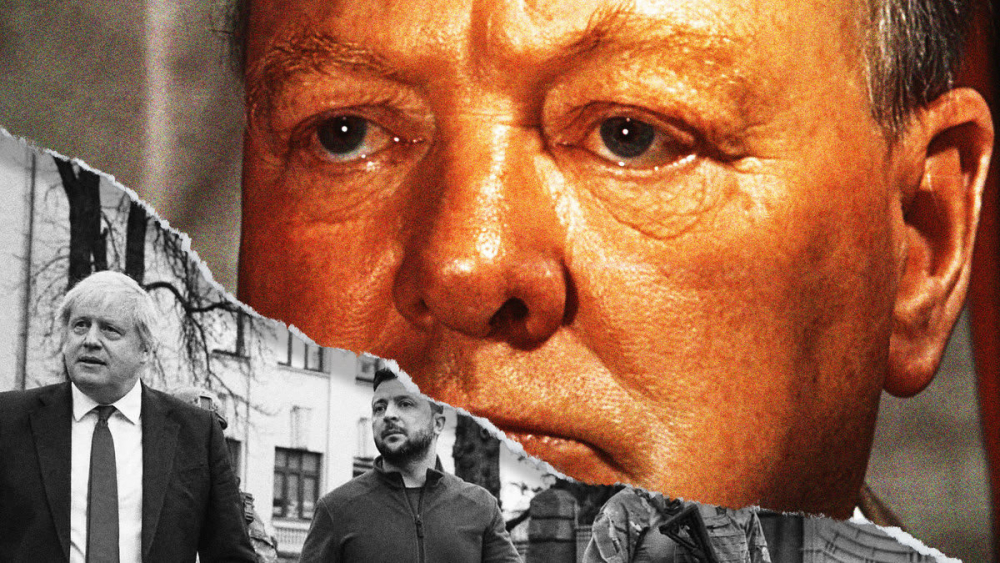
First, there was Volodymyr Zelensky’s defiant speech to the British parliament on March 8. Deliberately echoing Winston Churchill, he vowed: “We will fight until the end, at sea, in the air. We will continue fighting for our land, whatever the cost. We will fight in the forests, in the fields, on the shores, in the streets.”
Then, on a surprise visit to Kyiv on April 9, Prime Minister Boris Johnson walked with the Ukrainian president through the capital’s mostly empty streets flanked by armed soldiers. The message could not have been clearer: the two leaders will not be intimidated by Russia’s bombs and rockets any more than Churchill was by Hitler’s murderous arsenal.
Johnson was far from the first European leader to offer such a display of solidarity in Kyiv. On March 15, the leaders of Poland, the Czech Republic and Slovenia traveled there together, and shortly before Johnson’s visit, Zelensky separately hosted European Commission President Ursula von der Leyen and Austrian Chancellor Karl Nehammer.
Such ostentatious displays of a country’s commitment to its defense, reinforced by the equally public proclamations of solidarity by its allies, play a critical role in any major conflict. All the more so when the odds seem stacked against those seeking to stave off ruthless aggression. With a new major Russian assault on the eastern Donbas region looming, the idea is to inspire heroic narratives of resistance.
That is precisely what is happening now. But inevitably, such stories leave out the parts that might cast doubt on the firmness and consistency of their resolve in conflicts where the outcomes are far from preordained.
Churchill and his most fervent proponents were not immune to such doubts—something that is rarely mentioned in most of the accounts of his unquestionably heroic leadership. In conducting the research for my book 1941: The Year Germany Lost the War, I was struck by several examples. They suggest a sense of vulnerability that Churchill carefully hid from the public.
On May 10, 1940, King George VI summoned Churchill to Buckingham Palace. Despite his insistence that he had always believed in victory, Churchill’s behavior on that occasion told another story. Hitler’s armies had just invaded France, triggering the resignation of Prime Minister Neville Chamberlain, whose policy of appeasement was now fully exposed as a disastrous failure.
When Churchill emerged from the palace, his bodyguard, Scotland Yard detective W.H. Thompson, was waiting for him. “You know why I have been to Buckingham Palace, Thompson?” Churchill asked. The detective replied that he understood that the king had “at last” asked him to form a new government. “I only wish that the position had come your way in better times, for you have taken on an enormous task,” he added.
Churchill had tears in his eyes as he replied: “God alone knows how great it is. I hope that it is not too late. I am very much afraid that it is. We can only do our best.”
This was not the public Churchill exuding unbridled confidence in victory; this was the very private Churchill who knew that defeat was very much in the realm of possibility. But there was nothing devious about his pronouncements: they were the actions of a true leader. He knew he had to make his countrymen believe in victory if there was to be any chance of making it happen. Whatever his private doubts, Zelensky has absorbed that lesson well—as others have within his government and army.
The same held true for Churchill’s staunchest supporters, some of whom could not help but feel despair as the German blitzkrieg rolled across France and later German planes bombed London and other British cities, inflicting massive civilian casualties.
Conservative MP Harold Nicolson, who worked in the Information Ministry trying to bolster morale, made a secret suicide pact with his wife Vita Sackville-West, a poet and novelist. He secured poison pills they pledged to use if they were about to be captured by German invaders. As Nicolson explained to Sackville-West in a letter, he did not fear that kind of “honourable death;” what he did fear was “being tortured and humiliated.”
Those Americans in Britain who supported Churchill worked hard to counter isolationist sentiment in the United States, which was still officially on the sidelines in the war. Doomsayers like Joseph Kennedy, the outgoing U.S. ambassador, were predicting Britain’s defeat. General Raymond E. Lee, the military attaché at the London embassy, fully expected Hitler to have “a go at this country,” but insisted that Britain would survive—and he worked hard to assure a flow of more American supplies to the country. In the wake of bombing raids, he also walked freely about the city to survey the damage. “If there ever was a time when one should wear life like a loose garment, this is it,” he noted.
Like Churchill who also toured bombed out cities, Lee knew that such shows of confidence inspire more confidence, and courage inspires more courage. When allies like Lee, or in the present day, Boris Johnson, make even a brief appearance beside those who are running the greatest risks, this is more than just a symbolic gesture. In the fighting of wars, symbolism matters. And if maintaining the power of that symbolism requires suppressing private doubts, that is a price anyone aspiring to true leadership must be willing to pay. However he truly sizes up his country’s chances, Zelensky has no doubts on that score.









